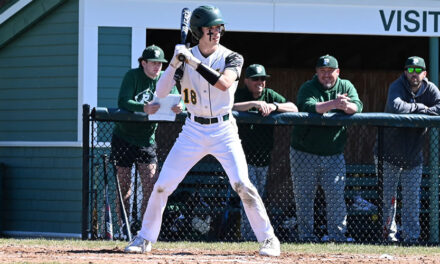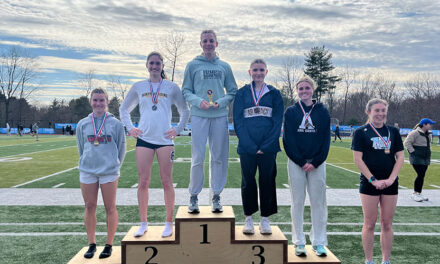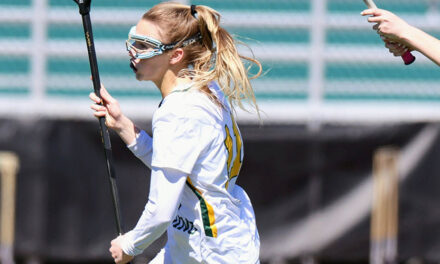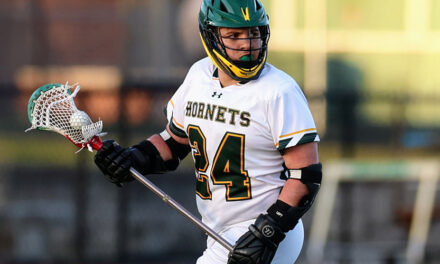Published in the August 6, 2015 edition
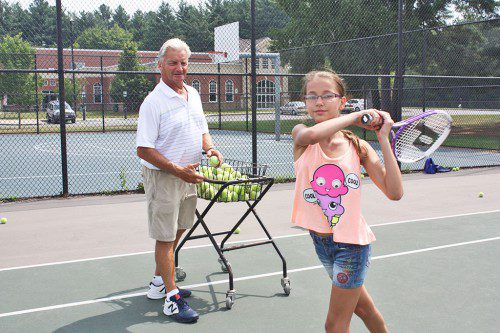
LYNNFIELD HIGH GIRLS’ TENNIS coach Craig Stone teaches 12-year-old seventh grader Alyssa Styller return techniques during a Lynnfield Community Schools (LCS) Tennis Camp on July 30. Stone has been running the LCS tennis camp for the past 30 years. (Dan Tomasello Photo)
By DAN TOMASELLO
LYNNFIELD — Craig Stone has dedicated his life to helping adolescents succeed on the tennis court for the past 35 years.
While Stone has earned a reputation for being one of the top tennis coaches in the state, the mild mannered Lynnfield High girls’ tennis coach and Summer Street School physical education teacher has also worked to help youngsters fine tune their skills and become better overall tennis players each summer.
Stone, 241 Central St., is currently in his 30th year running tennis camps for Lynnfield Community Schools.
“When I started the first camp in 1986 under (LCS Director) Sally Spencer, I was the only summer camp,” joked Stone, referencing Community Schools’ summer camps growing in popularity over the years.
Before Stone launched the LCS tennis camp, he served as the tennis director at Salem Country Club for three summers. The last year Stone worked at Salem Country Club, he pulled double duty and was in charge of the club’s pool as well. It was during this time Stone decided it was time to reinvent the wheel or in this case, the tennis ball.
“I decided that it would be more beneficial to run tennis programs for Lynnfield, where I was also the girls’ tennis coach, in hopes that I could expose more children to the sport and indirectly help the high school program in the future,” said Stone. “I initiated the possibility of a summer camp with Sally Spencer. She thought it would be a great idea as there were no summer programs through the schools.”
According to Stone, 70 children will be participating in LCS’ four weeks of tennis camps this summer. The weeklong camps last three hours a day, five days a week.
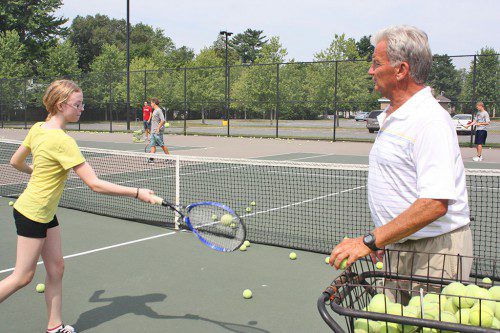
CRAIG STONE watches 12-year-old seventh grader Grace Mealey complete a return during a Lynnfield Community Schools Tennis Camp on July 30. The Lynnfield High School girls’ tennis coach has been running tennis camps for Community Schools for the past 30 years. (Dan Tomasello Photo)
“Each week is geared to a particular age level,” said Stone.
Stone said he has three goals for the tennis camps. He strives to teach students something about tennis they did not know before coming to camp, help improve campers’ skills and last but certainly not least, “have fun.”
Local camper Grace Mealey, a 12-year-old rising seventh grader, said she has learned a great deal about tennis at camp.
“I have enjoyed all of the practices and drills that we have done,” said Mealey. “I have learned a lot about tennis.”
Twelve-year-old rising seventh grader Alyssa Styller agreed.
“My favorite thing is competing against the campers,” said Styller. “I like to compete and win. I enjoy competition.”
Camper Jason Bruebe, a 12-year-old from Wilmington, agreed with his fellow campers’ sentiment.
“My favorite thing about this camp is the practicing games that we do after learning about forehand and backhand,” said Bruebe.
When asked what is the most rewarding aspect of running tennis camps, Stone said, “Watching (children) improve and enjoy the game.”
Stone a number of the players he coached on the Pioneers have attended his LCS tennis camp during the summer.
“I can’t remember a player on the Lynnfield girls’ team that, at one time or another over the past 35 years, wasn’t involved in my summer camp program or fall middle school tennis club,” said Stone.
Stone said the biggest difference between coaching youngsters and adolescents is “skill level and attention span.”
“We start with 6-year olds,” said Stone. “With many younger players, we are teaching tennis for the first time, so time is spent teaching proper strokes, drilling and playing lead up games as their ability to rally with each other is limited. Usually, around fourth grade and up, many come with previous experience, so we try to fine tune their strokes, give them an idea of the strategies involved in playing singles and doubles and activities can get more competitive. Because the younger student has a shorter attention span, we try to reinforce practice through the lead up games, as they are more apt to continue to drill knowing that there is a goal or object to the game.”
Stone said coaching high school players is different but he said the goal of helping students improve as tennis players is still the same.
“The high school player already has a level of skill that is competitive, so more time is spent with developing strategies, having them understand proper shot selection and keeping a positive mental attitude,” said Stone. “They understand the importance of drilling, and the need to continue to reinforce proper technique. With the skill level being greater, the competitiveness at practice and matches is much more intense than the camp experience.”
While Stone said there always been an “underlying theme” of introducing youngsters to tennis with the hope of local boys and girls competing for the high school tennis teams, he said the purpose of the tennis camps is much greater.
“It has always been my greater goal to give players the skills and knowledge necessary to play tennis competitively or recreationally, so that they can participate in a lifetime sport and enjoy the physical, social and emotional benefits that tennis can provide,” said Stone. “It is a game for all ages!”

